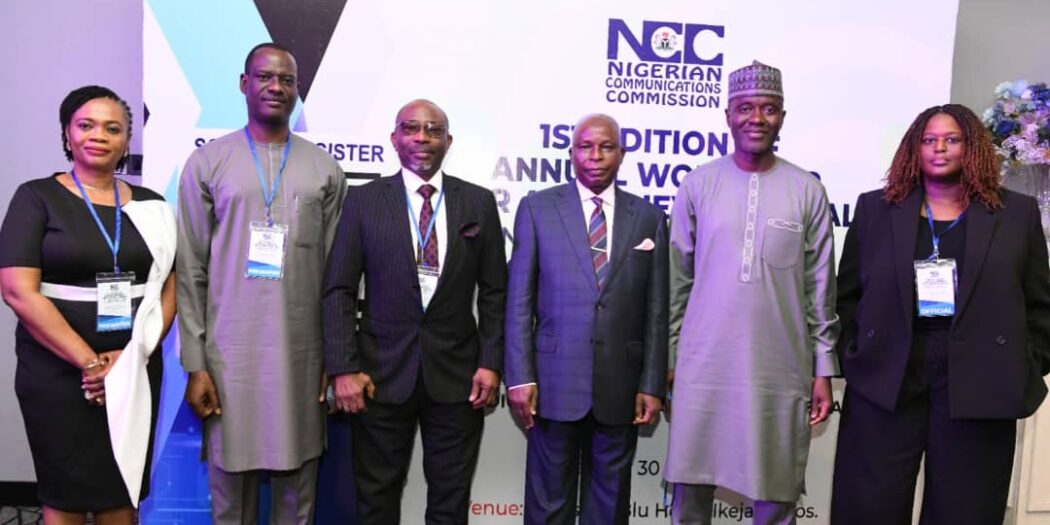The Federal Ministry of Justice and the Nigerian Communications Commission (NCC) have stressed the need for synergy to address the problems confronting the telecom sector that have led to investment drought.
Attorney-General of the Federation and Minister of Justice, Lateef O. Fagbemi, SAN and the Executive Vice Chairman/CEO of NCC, Dr Aminu Maida underscored this pressing need at the First Annual Workshop for Attorneys-General on Emerging Issues in the Communications Sector held at Radisson Blue Hotel, Ikeja, Lagos.
In his keynote on the occasion, the Justice Minister said digital transformation is critical to improvement in socio-economic development of a nation, adding that a well regulated communications sector implies enacting and implementing laws and regulations that ensure protection of rights including right to privacy, data protection and consumer rights as well as regulations that support the ease of doing business in Nigeria.
“The justice and judicial sector are therefore critical components for regulating communications in Nigeria. This inevitably entails upholding the rule of law by providing level playing fields for actors in the communications sector, preventing the exploitation of consumer rights through strengthening legal and regulatory frameworks and streamlining penal dispensation with a view to ensuring compliance with laws and regulations.
“Particular attention must be given to measures to curtail the destruction of infrastructure, by ensuring offenders are brought to book.
“It has been noted that Nigeria’s communications sector remains one of the dynamic and rapidly evolving sectors. According to recent data from the NCC, Nigeria has over 220 million active voice subscriptions as of Q1 2025, with broadband penetration now over 52 per cent. This connectivity supports everything from remote education to financial inclusion in both urban and rural areas. This administration is focussed on leveraging advancement in the communications sector as a tool for development and transformation of the economy,” the minister said.
According to him, the vehicle of this economic transformation is being hindered by some critical recurring challenges including, multiple taxation and levies imposed by federal, state and local authorities; wanton destruction of telecom infrastructure, especially in conflict-prone areas; regulatory overlaps that confuse operators and complicate compliance; slow broadband infrastructure roll-out which is due in part to right-of-way challenges and inconsistent state policies, among others.
Specifically, certain unfortunate incidents have been recorded such as the Ogun State Multiple taxation incident in 2024 which saw the temporary suspension of expansion projects as a result of overlapping local government levies, as well as vandalism of base stations in Kano in 2023.
“These incidents constitute economic sabotage, negatively impact the development of the communications sector and hinder digital transformation in the country.
“It is therefore critical that the three arms of government, as stakeholders cooperate and collaborate to address these issues and ensure improved regulation of the communications sector for enhanced socio-economic development. The legislature must review and strengthen laws that protect infrastructure and support the communications sector, while the executive reinforce measures aimed at implementing these laws. The judiciary is also a key stakeholder in ensuring offenders and saboteurs are made to face the full wrath of the law.
“These measures are not only to be adopted at the federal level. State governments also play key roles. Through institutional and governmental cooperation, we can eliminate some of these challenges, such as in 2023 when Anambra State proactively adopted a unified right-of-way policy, resulting in a 38 per cent increase in fibre optic expansion within six months. Proactive measures like these are laudable and I encourage all stakeholders to support the developmental efforts of the NCC.
“I therefore wish to recommend that stakeholders work towards adopting strategies and mechanisms that enhance synergy in regulating communications for the digital transformation in Nigeria. “These include legal and policy harmonization, creation of a Federal-State regulatory coordination forum, adopting uniform Right of Way (RoW) Policy implementation, joint enforcement of laws that protect infrastructure and consolidation of digital taxation framework,” the minister said.
Attorneys-General as Chief Law Officers under the constitution are uniquely placed to drive synergy. “We must be able to advise our respective governments on policies that affect the digital economy, ensure that our laws and enforcement actions are constitutionally sound and support dispute resolution mechanisms that prevent prolonged litigation. We must also work to champion data privacy, cyber security and digital rights enforcement at the state level.
“As Attorneys-General, let us commit to working together with the NCC and relevant stakeholders to deliver on the vision of a transformed communications sector, for enhanced socio-economic development of our nation,” he averred.
In his welcome address, Dr Maida said the theme of the workshop—”Building and Driving Synergy in Regulating Communications for the Digital Transformation of Nigeria”—reflects the Commission’s belief that collaboration is not optional, but essential. No sector, especially one as dynamic and impactful as communications, can be effectively regulated in isolation, he stressed.
According to telecom sector chief regulator, the communications sector remains a vital enabler of innovation, commerce, governance, and inclusion.
“However, to fully unlock its potential, we must tackle a range of challenges that cut across legal, regulatory, fiscal, and operational domains.
“This is where your role, as Attorneys-General, becomes critical. You are not only the Chief Law Officers of your states; you are also policy influencers and key partners in shaping the legal frameworks that support national development.
“Your insights and guidance help ensure that innovation happens within a structure that promotes fairness, accountability, and long-term stability,” Dr Maida said.
He recalled that since the early 2000s, communications regulation has evolved through distinct phases—from liberalising markets and establishing independent regulators, to expanding broadband infrastructure and fostering universal access. In the 2010s, attention shifted to protecting consumers, enabling digital financial services, and addressing cross-sectoral challenges.
“Today, regulators are focused on advanced frontiers such as AI governance, digital resilience, and sustainable connectivity. “Throughout this journey, one constant remains: collaborative, forward looking regulation is essential to sustaining innovation and inclusive digital growth,” he said.
He said the forum was designed to address some of the most pressing issues in the sector today, including: “A review of the Nigerian Communications Act (2003): We will reflect on its strengths, limitations, and areas for reform to ensure it remains fit for purpose in a rapidly evolving digital age.
“Streamlining taxation in the communications sector: The issue of multiple and inconsistent taxes continues to deter investment. We must work together to harmonize tax regimes and remove disincentives to growth.
“Addressing regulatory overlaps: Fragmented oversight creates confusion and inefficiencies. Our goal is to explore reforms that enhance coordination and legal clarity across agencies.
“Protecting Critical National Information Infrastructure (CNII): Following the 2024 Executive Order signed by President Bola Tinubu, the designation of communications infrastructure as CNII gives us a new framework for collaboration with the Office of the National Security Adviser and other stakeholders; we must now operationalize it effectively.
“As Nigeria accelerates its digital transformation, underpinned by technologies such as AI, IoT, and high-speed connectivity, the challenges will grow more complex; but so too will the opportunities. To succeed, we must adopt a whole-of-government approach that leverages the strengths of all institutions—federal and state,” he said.
He said the NCC remained committed to working with judicial officers to align regulatory actions with broader national goals.
“We believe the Attorneys-General have a strategic role to play—not just in interpreting the law, but in shaping an enabling legal environment where technology and governance work in tandem.
“This workshop is just the beginning. We hope it will become an annual platform for knowledge exchange, mutual understanding, and joint problem-solving. I am confident that the conversations we start here will lead to stronger partnerships and better outcomes for the Nigerian people,” Dr Maida added.






